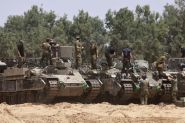- Home
- Middle East
- Iran-Backed Militias in Iraq Ready to Disarm to Avert Trump Wrath

Fighters lift flags of Iraq and paramilitary groups, including al-Nujaba and Kataib Hezbollah, during a funeral in Baghdad for five militants killed a day earlier in a US strike in northern Iraq, on December 4, 2023. ©(Photo de AHMAD AL-RUBAYE/AFP)
In a significant shift, several powerful Iranian-backed militias in Iraq are prepared to disarm for the first time to avert an escalating conflict with the Trump administration, according to 10 senior commanders and Iraqi officials. The move comes after repeated private warnings from U.S. officials to Baghdad, threatening airstrikes if the militias were not disbanded.
Discussions between Prime Minister Mohammed Shia al-Sudani and militia leaders are "very advanced," said Izzat al-Shahbndar, a senior Shiite politician close to Iraq's governing alliance. The groups, including Kataib Hezbollah, Nujabaa, Kataib Sayyed al-Shuhada, and Ansarullah al-Awfiyaa, are inclined to comply with U.S. demands for disarmament.
"Trump is ready to take the war with us to worse levels, and we want to avoid such a bad scenario," a Kataib Hezbollah commander told Reuters, speaking anonymously. Iran's Revolutionary Guards (IRGC) have given their blessing for the militias to make decisions necessary to avoid a potentially ruinous conflict with the U.S. and Israel.
The militias, part of the Islamic Resistance in Iraq, have claimed responsibility for dozens of attacks on Israel and U.S. forces in Iraq and Syria since the Gaza war began 18 months ago. They collectively command about 50,000 fighters and arsenals that include long-range missiles and anti-aircraft weapons.
Prime Minister Sudani is committed to bringing all weapons under state control through "constructive dialogue," said his foreign affairs adviser, Farhad Alaaeldin. Some groups have already evacuated their headquarters and reduced their presence in major cities like Mosul and Anbar, fearing airstrikes.
The U.S. State Department continues to urge Baghdad to rein in the militias, emphasizing they must answer to Iraq’s commander-in-chief, not Iran. However, an American official expressed skepticism about the long-term viability of any disarmament, citing past instances where militias temporarily ceased attacks under pressure.
The discussions mark the first time the militias have been willing to concede to Western demands for demilitarization. This shift comes as Iran’s regional "Axis of Resistance" faces severe challenges, including the Gaza war, U.S. strikes on the Houthis, and the weakening of key allies like Syria’s Bashar al-Assad.
Iraq is navigating a delicate balance between its alliances with the U.S. and Iran. The militias, which emerged after the 2003 U.S. invasion, have become formidable forces rivaling the national army. U.S. Defense Secretary Pete Hegseth recently urged Sudani to prevent revenge attacks on Israel and U.S. bases by the militias.
"If we do not voluntarily comply, it may be forced upon us from the outside and by force," warned Ibrahim al-Sumaidaie, a former adviser to Sudani, highlighting the stakes for Iraq.
The IRGC declined to comment, while Iranian and Israeli ministries did not respond to queries. As discussions continue, the fate of disarmament remains uncertain, but the willingness of the militias to negotiate marks a notable turning point in the region’s complex dynamics.
Read more



Comments